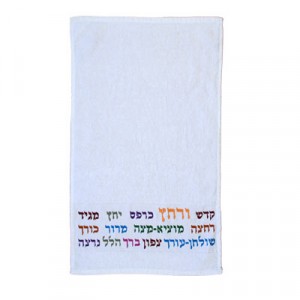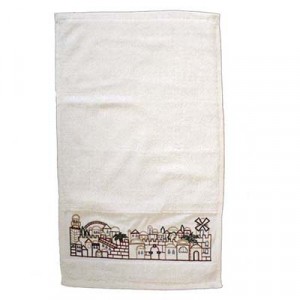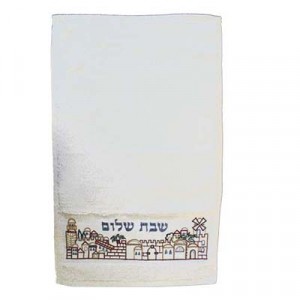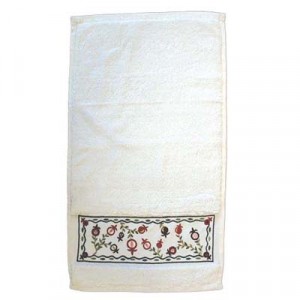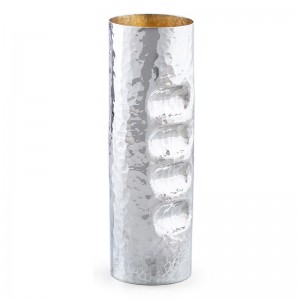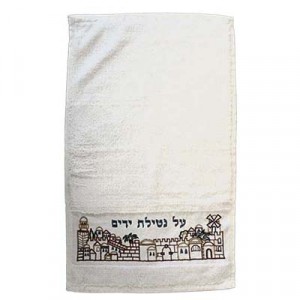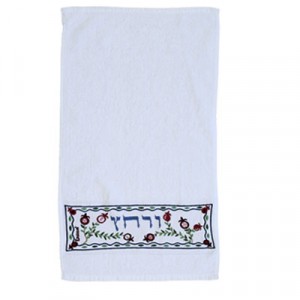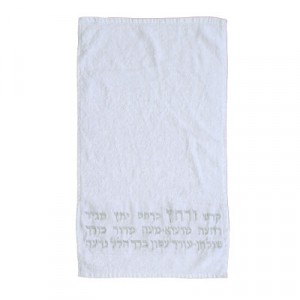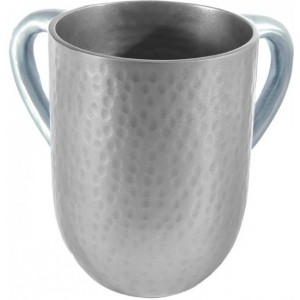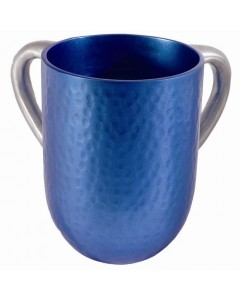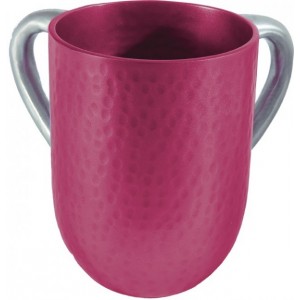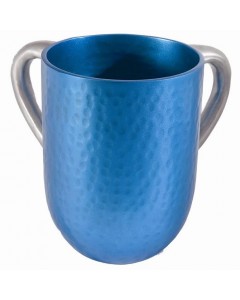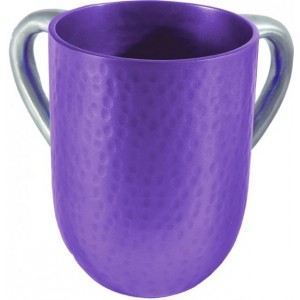Washing Cups
Looking for ritual hand washing cups for your home or as a gift to a friend? World of Judaica has an extensive selection of washing cups that range in material and design. Feel free to browse through our assortment of lovely wash cups and kitchen items for your Jewish home.
What are washing cups? Washing cups are cups used specifically for the purpose of ritual hand washing. The washing of the hands is important in Judaism, as it makes someone ritually pure before they eat. Jews are commanded to wash their hands and say a blessing before a meal. The blessing is called 'Netilat Yadiim.'
Washing cups can come in a variety of shapes and sizes. Most cups are made with two handles to ensure that the unwashed hand does not come into contact with the washed hand. Browse the collection of wash cups and more Judaica for sale here.
In Jewish homes, washing cups are often displayed by the sink in the kitchen. The cups that are prominently displayed are usually the most beautifully decorated and made of more expensive material. There are other types of cups that are used for traveling or camping, which are made of more pliable materials such as plastic.
World of Judaica's collection of hand washing items includes a plethora of wash cups and hand towel sets. The washing cups come in high quality materials such as polished silver, stainless steel, copper, and ceramic. Each cup has its own unique design, some feature Passover designs. Many of the cups feature images of Jerusalem as well as the words of the hand washing blessing written in Hebrew. Our collection includes children's cups with animated designs. Washing cups make for great gifts to family and friends for a Jewish wedding or housewarming. Make sure to check out the collection of Yair Emanuel washing cups. Ths Israel artist famous for the Emanuel Tallit has equally beautiful designs for washing cups.
Washing Cups Guide
The Jewish ritual of hand washing is one that occurs many times throughout every day, and also on various particular or special occasions. It is practiced primarily by religiously observant Jews for spiritual and religious reasons, not for reasons of health or cleanliness (though, of course, it is good to wash hands for those reasons too!) But unlike washing the hands for reasons of cleanliness, it involves a special ritual, which includes pouring the water from a washing cup or pitcher over the hands. This makes washing a more conscious and deliberate ritual act, turning what would be mundane and ordinary into something holy. Ritual hand washing is usually accompanied by a special blessing known as “Netilat Yadayim” (literally, “raising of the hands.”)
Hand Washing Before Meals
The ritual of washing the hands is most frequently performed before consuming any meal containing bread. The practice is to pour water from a washing cup or glass first two times over the right hand, then two times over the left. (Some traditions prescribe pouring the water three times over each hand instead of two.) It is important that one’s unwashed hands do not touch the water to be used for the washing. It is also important that once one hand is washed, it does not touch the other, unwashed hand. For this very practical reason, many washing cups are made with two handles, making it easier to keep the two hands from touching each other in the middle of the process. Then the hands are lifted and dried with a towel, and the blessing is recited. It is customary not to speak between saying the “Netilat Yadayim” blessing, after washing the hands, and the “Motzi” blessing, just before eating bread.
Hand Washing at Other Times
Observant Jews also ritually wash their hands with a similar procedure first thing after getting up each morning. One difference is that the water is poured three times over each hand while alternating between them (instead of two or three times over each hand consecutively). Ritual hand washing is also performed immediately after using the bathroom, and then it is followed by the “Asher Yatzar” prayer, which thanks G-d for the miraculous intricacy of the human body.
Hand Washing for Other Occasions
The Passover Seder includes the usual ritual for washing hands and saying the “Netilat Yadayim” blessing before eating a meal containing bread (in this case, matzah). However, it also includes an additional step for washing the hands earlier in the service (before eating the green vegetable). At this point, however, the hands are washed without saying a blessing.
Washing Cups
Whether or not one engages in the ritual of hand washing as a daily practice, hand washing cups can be a lovely addition to any Judaica collection. Those for everyday use can be quite simple and made of any inexpensive material such as metal or plastic, while the more collectible variety are often made from finer materials, including ceramic, copper, silver, or glass. Washing cups are often inscribed with the Hebrew words “Netilat Yadayim” or other Jewish symbols and are sometimes accompanied by special towels or basins in which to pour the water.
For More Information
For more information on Washing Cups or Shabbat, feel free to contact our Judaica experts with any questions or concerns.

